And How Was Your SXSW?
Opted out of swinging from the wrecking ball when I saw this waiver. A selfie isn’t worth dying for. pic.twitter.com/w4YhzHqTY0
— Gillian Lanyon (@gillianlanyon) March 9, 2014
There’s only one news report or image needed from SXSW, and this is it: pic.twitter.com/UKyzKQCmXF
— Tom Gara (@tomgara) March 9, 2014
You Are What You Tweet
Are you what you tweet? Let’s say yes. Using Tweetails, we obtained the data of most-used words for different Twitter accounts. Some groupings began to suggest themselves. Certainly, some unflattering self-portraits emerged.
Sir Mix-A-Lot

Justin Bieber
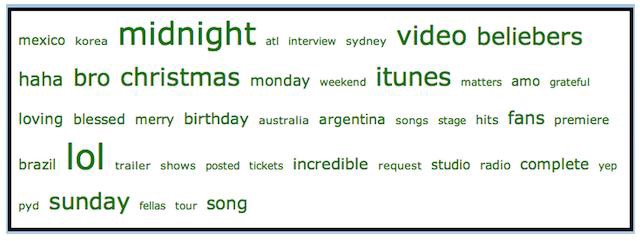
Tina Brown
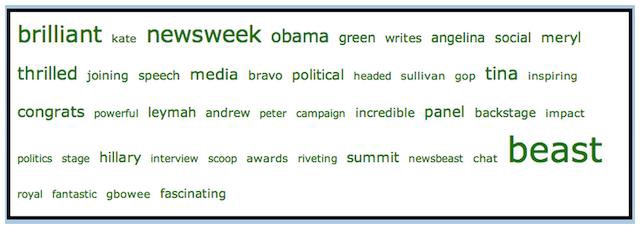
Nick Denton
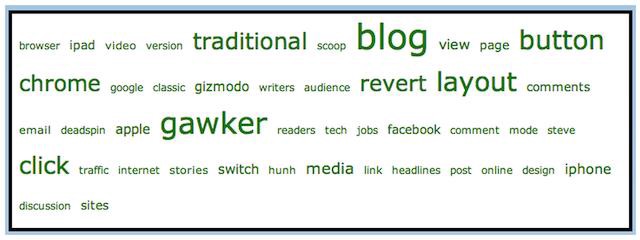
Nicki Minaj

Mia Farrow

John Cusack

Ezra Klein

Mark Halperin

Ben Smith
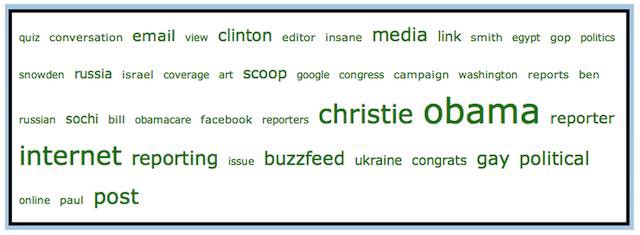
Donald Trump
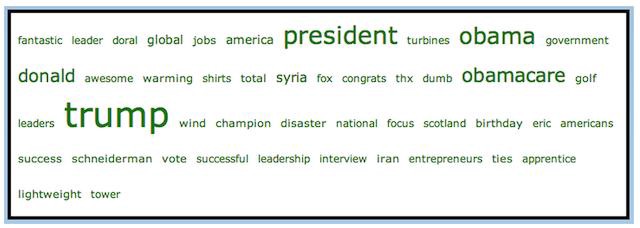
Erick Erickson

Jeffrey Goldberg

Michelle Malkin
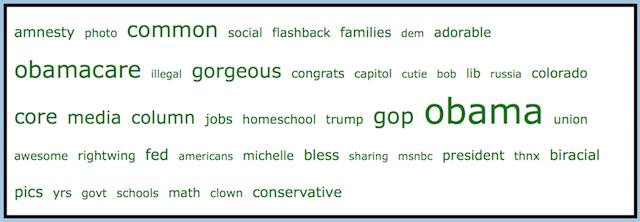
Rebecca Traister
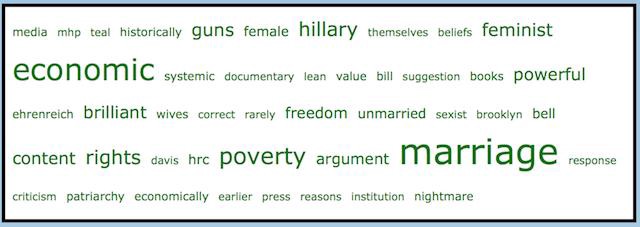
Tyra Banks

Desus

Ted Nugent
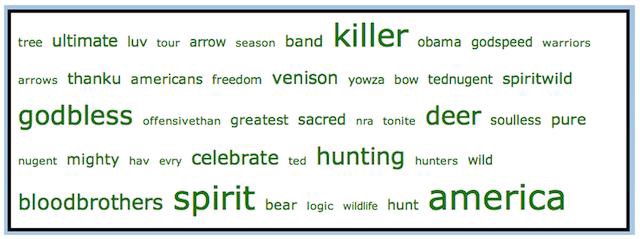
Stephen King

Sam Biddle

Jack Dorsey

Sarah Silverman

Andy Richter

Elon Green is a contributing editor to Longform.
New York City, March 6, 2014

★ Another step backwards into the freezer. In defiance of the early forecasts, the cold was intractable. Bars of reflected light lay partway over the crosswalk like misplaced pavement markings. Hands were gloved, gloved and balled, jammed into pockets. The noontime streets were sparsely peopled. Blood spread over one side of the tongue from a split lip.
Another Fucking Thing Is 20 Years Old
https://www.youtube.com/watch?v=WDswiT87oo8
“Girls & Boys camouflaged itself well: on the surface it was a gaudy tale of holidaymakers trading STDs in Kavos, recounted over trashy electro. But bubbling away underneath was the culmination of a plan that had hatched in Damon Albarn’s mind many months before: how to halt the pervading Americanisation of guitar music and reassert some belief into a British scene suffering from an identity crisis.”
— You know what’s old now? Everything.
Future, "Move That Dope" Ft. Pharrell Williams and Pusha T
“This is my shit,” notes NahRight’s Eskay, and after a considered evaluation I find it difficult to disagree.
Ball Floaty
Is this “the creepiest thing you’ll see all day”? Uh, I hope so? You probably don’t need any more creepiness in your life today. Or this week, really? Can you believe we are still in the same week that started with the Oscars? A week with Mardi Gras and Ash Wednesday? The Bitcoin dude was only yesterday. Sweet Mother of God will it ever end? Anyway, enjoy.
How Do We Know Who People Are?

It seems worthwhile to revisit the idea of the universal reputation market, in light of Schrödinger’s Satoshi Nakamoto. Is this man Satoshi, or isn’t he? For now, he equally is and he definitely isn’t the progenitor of Bitcoin. No one has yet elaborated a way to decide.
One way, of course, that we might discover if this person is Satoshi Nakamoto is through constant surveillance — both physical and digital. Would that be a good thing?
How do we know who people are? We have some definite if hackable systems, like social security numbers. Names are a problem; sometimes unique, often not. So people are who they say they are — except, more and more, they are who we’re told they are.
Just a few years ago, when we looked at the technology that was leading to a reputation market, where every person’s value might be calculated, we worried more about constant self-reporting. There were check-in apps, like Foursquare, and there was identity-tracking, like with Facebook and Google — primarily in the service of revenue. (We never worried about LinkedIn; business endorsements are mostly just meaningless back-scratching. Maybe we should?)
But in the last year or so, how we identify people and their characteristics and reputations has turned inside out. Apps like Whisper and Secret, where people can dump one-off messages anonymously, so far lack narrative and database coordination. Secret is mostly just a pile of junk and garbage. This will change. It’s not hard to track and organize the proper nouns or tags in submissions to those apps. Their work as data collection, not just broadcast, is their future. It’s a hop and a skip to have an anonymously sourced database of reputation.
“Gwyneth Paltrow is cheating on Chris Martin With entertainment lawyer Kevin Yorn (You heard it here first)” #whisper pic.twitter.com/dP9TcPqYO4
— Whisper (@WhisperApp) February 18, 2014
What else, after all, is an editorial project built within Whisper to do?
Lulu was in a similar place when it started a year ago. The dating app — “Yelp for men”! — allowed women to review any fellow anywhere. But just a couple weeks ago, Lulu made a radical move to a new system. Now men must opt-in to have their reputations managed by whoever wanted to discuss them. While Lulu was definitely tasty as an attack on male privilege — and many men definitely responded with a kind of horror that they’d clearly never experienced before! — it was still pretty gross, unfair and possibly not actually that useful. (And it took much of the surprise out of dating. Who wants that?)
But Lulu showed some of the limits of tolerance for a reputation market. Or, at least, for a reputation market of just men. They weren’t going to stand for that.
Then, three months ago, out came Yik Yak. Now literally unavailable in Chicago, the app is essentially local anonymous chat. So far it’s resulted in school shutdowns over bomb and shooting threats.
Here’s what Yik Yak looks like near me in Midtown Manhattan. It’s fairly useless. (The Ethiopia reference, context clues suggest, is about… Model U.N.)

Yik Yak’s creators praise the idea of local and ephemeral reputation markets like so:
Your popularity, race, gender, sexuality, and looks don’t mean anything on Yik Yak. Anonymity levels the playing field. You can be the quietest person on campus and the most popular poster on Yik Yak. The only thing you are judged on is the content that you have created, nothing else.
This idea of reputational meritocracy has a strong hold on proponents of the reputation market. (“You’re awesome, now everyone will know you’re awesome.”) It dovetails with the idea of meritocracy and success in Silicon Valley nicely.
The idea of perfect freedom through anonymity is most often espoused by people who have never been on the clubbing end of the stick. And yet, privacy and the ability to be anonymous seems more important than ever.
For the last couple weeks, the founder of an app called Reput has been trying to get us (and probably everyone else) to write about them. They write: “Reput is an App (available for iOS AND Android devices) that allows users to share opinions regarding any of the contacts they have into their contact’s app, regardless of whether they are already using the App or have never heard of it yet. We developed it to reproduce the way reputation used to be built.”

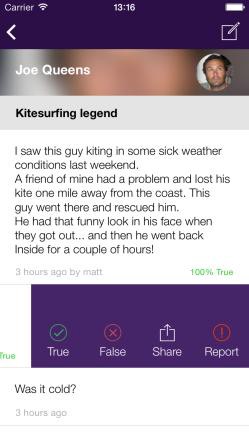
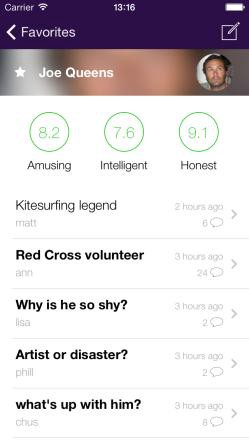
I wrote back to Reput’s founder and told him that his app was disgusting and a sign of the end times. He wrote back:
I believe many of the issues that are arising in our increasingly complex communities are derived from a non functional reputation building process. Reputation is so contextual now that it just doesn’t work anymore.
We really are doing this for the good and believe its net impact is going to be great por society (think about the impact that radars have on our driving)
In most of the cases, some people are horrible in one circle and get away out of it being treated as honorable ones because info doesn’t flow and their reputation doesn’t reflect any of that. In the other hand we all know those great ones that aren’t getting proper recognition for being amazingly good, just because most of the others don’t know anything about it.
In the eyes of founders like this, we will arrive at the one true truth, once we expose everything. The reputation market will settle everything.
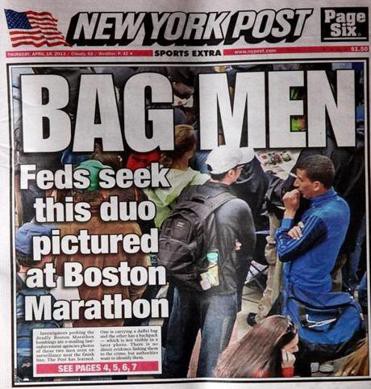
These technophiliacs, like Gawker publisher Nick Denton, believe that truth is always settled on by the masses. The more people that have the ability to express facts or opinion — or, logically, to make claims about identity — the better off we will all be. To Denton’s mind, mass transparency and participation will eventually make all truth available and obvious. Similarly to the thoughts of Reddit’s group-mind, we will crowd-source the truth about Nakamoto’s identity.
But that conflicts with Reddit’s other belief: that he should be left alone.
Reddit is a reputation market but only for custom-built identities. Redditors are free to reveal as much or as little of their actual selves as they wish, even as they are upvoted (and downvoted!) on the value of their contributions — their reputations. This is in part why “doxing” (whether it’s actual doxing or just revelation) sends such shudders to Reddit’s core.
But actually, Reddit’s collective anxiety is a good one. We should all be in favor of the privacy of identity. That doesn’t mean, however, that some identities are either newsworthy — or aren’t deserving of privacy.
The fantasies about the impact of doxing as expressed on Reddit are fascinating. Satoshi Nakamoto will be murdered by the mafia, the government, by marauders, according to Redditors. His life is over. He will need 24-hour protection. When the Reddit user Violentacrez was doxed, Redditors were furious about the idea of betrayal, that this man’s life had been ruined. His actual real-life reputation (really, just some dude) had collided with his alternate online reputation (really nasty piece of work).

The opposite can also happen. For instance, a man who went by Carl H, who was very lovely and popular on Reddit, helping people learn to code, was, in the real world, allegedly keeping his nine-year-old son captive in his home for pornography and sexual assault. The resulting collision of his identities was something to behold.
Donations for Dorian Nakamoto are pouring in. Let’s show the world what the bitcoin community is all about. https://t.co/T2vVWLh1bg
— AndreasMAntonopoulos (@aantonop) March 7, 2014
In less extreme cases, anyone can be cast into a fight for control of his or her reputation. What then? So far, not too many real-world disasters have accumulated — unless you count examples like the many, many mistakes of the TSA’s Do Not Fly list.
The state, so far, has had a monopoly on the reputation market. All the technological innovations leading us always closer to a privatized or commercial reputation market are quite new.
What happens when we’re all the TSA? Confusion in the reputation market can be a minor nightmare in social media, though being annoyed online is a far cry from being denied the right to travel. (Or being denied a bank loan, or a driver’s license.) Here’s one piece of advice from way back in 2010 that all the Satoshi Nakamotos might want to consider: give in, go unique, stop fighting, be identifiable.
Some of you may have a name that is either shared by many or shared by someone already occupying a portion of public space…. Solution? Pick a new name. True, only the flaky did that, back in the day, but that was before all these ones and zeros were flying around through the ethers, and so adapt now and let everyone else wonder what flaky used to mean. And take a cue from intellectual property management, and make up your new name from nothing, giving it distinctness and preeminent SEO.
Great for your brand — as long as your brand is on the up-and-up. You’ll rue the day that you do something horrible — or the day that someone decides to say that you have. It’s in their hands now.
This afternoon, Newsweek released a statement about their story identifying Satoshi Nakamoto. This was a salvo in the war for their own reputation in the market, of course. It ended: “it encourages all to be respectful of the privacy and rights of the individuals involved.” The “it” was Newsweek; a strange and old-fashioned way for the editors to refer to themselves. But we’re already deeply lost in a tangle about what’s left of privacy, a tangle that Newsweek happily jumped right into. Now who knows where privacy and “rights,” whichever kind of rights those might be, should stop or begin?
Biennial Alternatived
99 times out of 100 starting a story with “This year there is a Brooklyn-based alternative to” is an automatic adjuration to close tab, but just this once I’ll let it slide.
A Poem By Lisa Olstein
by Mark Bibbins, Editor
Blue Water Navy
Darling, the world, it will come at you
with the migrating eyes of flounder
traveling through the matter of their own heads
having reimagined axis and ground.
There is a certain parasite that turns a crab
from male to female, or is it female to male?
The average male armadillo’s penis is larger
than that of some gorillas. I can’t help it
if most facts are, in fact, facts about sex.
Don’t bother pretending; don’t try to
fix this for me. We acquire debt.
An animal is able to live in captivity
which is where we take our measurements.
Watching them go at it sometimes we like to
say outgunned, outmanned, but definitely
not outfought. What we like is the idea
of making the invisible visible. True love
takes a lifetime of research. The foot
of the lake meets the mouth of the river.
Lisa Olstein is the author of three books of poems, most recently Little Stranger (Copper Canyon Press, 2013). She teaches in the MFA program at the University of Texas at Austin.
You will find more poems here. You may contact the editor at poems@theawl.com.
